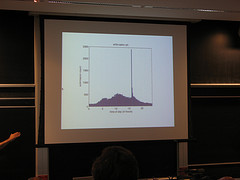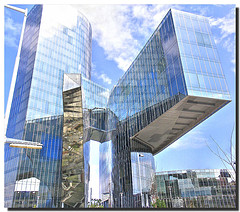October 7th, 2009 by Eugene Barsky | No Comments »

A new article today in the Journal of the American Society for Information Science could be of interest to those of you who post their studies to arxiv.org:
A. Haque and P. Ginsparg, “Positional effects on citation and readership in arXiv,” J. Am. Soc. Inf. Sci. Technol., vol. 60, pp. 2203-2218, 2009.
Abstract:
arXiv.org mediates contact with the literature for entire scholarly communities, providing both archival access and daily email and web announcements of new materials. We confirm and extend a surprising correlation between article position in these initial announcements and later citation impact, due primarily to intentional  self-promotion
self-promotion by authors. There is, however, also a pure
by authors. There is, however, also a pure  visibility
visibility effect: the subset of articles accidentally in early positions fared measurably better in the long-term citation record. Articles in astrophysics (astro-ph) and two large subcommunities of theoretical high energy physics (hep-th and hep-ph) announced in position 1, for example, respectively received median numbers of citations 83%, 50%, and 100% higher than those lower down, while the subsets there accidentally had 44%, 38%, and 71% visibility boosts. We also consider the positional effects on early readership. The median numbers of early full text downloads for astro-ph, hep-th, and hep-ph articles announced in position 1 were 82%, 61%, and 58% higher than for lower positions, respectively, and those there accidentally had medians visibility-boosted by 53%, 44%, and 46%. Finally, we correlate a variety of readership features with long-term citations, using machine learning methods, and conclude with some observations on impact metrics and the dangers of recommender mechanisms.
effect: the subset of articles accidentally in early positions fared measurably better in the long-term citation record. Articles in astrophysics (astro-ph) and two large subcommunities of theoretical high energy physics (hep-th and hep-ph) announced in position 1, for example, respectively received median numbers of citations 83%, 50%, and 100% higher than those lower down, while the subsets there accidentally had 44%, 38%, and 71% visibility boosts. We also consider the positional effects on early readership. The median numbers of early full text downloads for astro-ph, hep-th, and hep-ph articles announced in position 1 were 82%, 61%, and 58% higher than for lower positions, respectively, and those there accidentally had medians visibility-boosted by 53%, 44%, and 46%. Finally, we correlate a variety of readership features with long-term citations, using machine learning methods, and conclude with some observations on impact metrics and the dangers of recommender mechanisms.
** Photo by http://www.flickr.com/photos/easternblot/ – “Paul Ginsparg shows that everyone submits their paper to ArXiv *just* after the submission deadline so they’ll be the first on the front page the next day”
Posted in Astronomy, Atmospheric Science, Chemical and Biological Engineering, Chemistry, Civil Engineering, Earth and Ocean Sciences, General Science, Geography, Main, Materials Engineering, Mathematics, Mechanical Engineering, Mining engineering, Physics, Science - undegraduate classes, Statistics, Uncategorized | No Comments »
October 1st, 2009 by Eugene Barsky | No Comments »
Those of us, who teach or use Google or Google Scholar (GS) might find the most recent Peter Jacso’s piece on Google Scholar to be of interest – http://www.libraryjournal.com/article/CA6698580.html?&rid=1105906703&source=title
Please be very careful using this tool. We talk about the perils of GS and compare it with Compendex and Web of Science in our Google workshops.
We ourselves saw those problems almost five years ago, and they are still not corrected:
Giustini D, & Barsky E. A look at Google Scholar, PubMed and Scirus: comparisons and recommendations . J Can Health Libr Assoc 2005, 26(3): 85-89.
Posted in Astronomy, Atmospheric Science, Chemical and Biological Engineering, Chemistry, Civil Engineering, Earth and Ocean Sciences, General Science, Geography, Main, Materials Engineering, Mathematics, Mechanical Engineering, Mining engineering, Physics, Science - undegraduate classes, Statistics, Teaching, Wood Sciences | No Comments »
September 16th, 2009 by Eugene Barsky | No Comments »

Scott Dunbar is an associate professor in the Norman B. Keevil Institute of Mining Engineering at the University of British Columbia. His recent work on biomining was highlighted in UBC Reports a few months ago – “The virus that binds: A novel idea marries biology and mining”
You can see much of the biomining research in the Web of Science database (for UBC folks, here is the direct link to the appropriate search )
** photo by Martin Dee
Posted in Chemical and Biological Engineering, Chemistry, Earth and Ocean Sciences, General Science, Main, Materials Engineering, Mining engineering, Science - undegraduate classes | No Comments »
August 25th, 2009 by Eugene Barsky | No Comments »

I have posted about climate engineering before. Here is the new article from the last issue of Science that discusses the risks of climate engineering – “Risks of Climate Engineering”
Risks of Climate Engineering
Gabriele C. Hegerl and Susan Solomon (21 August 2009)
Science 325 (5943), 955. [DOI: 10.1126/science.1178530]
This short opinion article presents the points against temperature changes potentially caused by geoengineering…
** photo by http://www.flickr.com/photos/courambel/
Posted in Atmospheric Science, Chemical and Biological Engineering, Earth and Ocean Sciences, General Science, Geography, Main, Physics | No Comments »
August 18th, 2009 by Eugene Barsky | No Comments »

All IMS articles 2004 and forward are freely available in a postprint format on arXiv <http://arxiv.org/>, as well as those articles posted by authors.
From the IMS website: http://www.imstat.org/publications/arxiv.html
ArXiv is an open access, fully automated electronic archive and distribution server for research articles, now owned and operated by Cornell University, and partially funded by NSF. The main fields it covers are physics, mathematics, non-linear science, computer science, and quantitative biology. Recently, arXiv has cooperated with IMS and the Bernoulli Society to open up a new statistics category within mathematics. We expect this category to eventually grow into a top level archive comparable to e.g. mathematics and physics.
Great news, IMS!
** photo by http://www.flickr.com/photos/saz/
Posted in Main, Mathematics, News, Science - undegraduate classes, Statistics | No Comments »
August 7th, 2009 by Kevin Lindstrom | No Comments »
“Vanish is a research system designed to give users control over the lifetime of personal data stored on the web or in the cloud. Specifically, all copies of Vanish encrypted data — even archived or cached copies — will become permanently unreadable at a specific time, without any action on the part of the user or any third party or centralized service.”
“For example, using the Firefox Vanish plugin, a user can create an email, a Google Doc document, a Facebook message, or a blog comment — specifying that the document or message should “vanish” in 8 hours. Before that 8-hour timeout expires, anyone who has access to the data can read it; however after that timer expires, nobody can read that web content — not the user, not Google, not Facebook, not a hacker who breaks into the cloud service, and not even someone who obtains a warrant for that data. That data — regardless of where stored or archived prior to the timeout — simply self-destructs and becomes permanently unreadable.”
For more information, visit the Vanish site at the Department of Computer Science, University of Washington.
There is a also a technical paper that will be presented at the 18th USENIX Security Symposium taking place this August in Montreal.
Submitted by Kevin Lindstrom Liaison Librarian for Electrical and Computer Engineering
Posted in General Science, Main, Uncategorized | No Comments »
August 5th, 2009 by Eugene Barsky | No Comments »

The International Mathematical Union is offering videos that were recorded at the International Congresses of Mathematicians in 1998, 2002, and 2006. IMU maintains the copyright of the videos but gives everyone interested the permission to download and show the videos.
http://www.mathunion.org/activities/icm/videos
** photo by http://www.flickr.com/photos/mscolly/
Posted in Main, Mathematics, Science - undegraduate classes | No Comments »
July 20th, 2009 by Eugene Barsky | No Comments »

New Scientist reports about the final draft of the American Meteorological Society‘s carefully worded position paper on geoengineering. The AMS is the first major scientific body to officially endorse research into geoengineering.
From New Scientist:
The document states that “deliberately manipulating physical, chemical, or biological aspects of the Earth system” should be explored alongside the more conventional approaches to climate change. Conventional approaches means reducing emissions – “mitigation” in policy-speak – and adjusting to the unavoidable effect of climate change – known as “adaptation”.
The paper states that “even aggressive mitigation of future emissions cannot avoid dangerous climate changes resulting from past emissions. Furthermore, it is unlikely that all of the expected climate-change impacts can be managed through adaptation. Thus, it is prudent to consider geoengineering’s potential benefits, to understand its limitations, and to avoid ill-considered deployment”.
http://www.newscientist.com/article/dn17490-climate-engineering-research-gets-green-light.html?DCMP=OTC-rss&nsref=online-news
** photo by courambel
Posted in Atmospheric Science, Chemical and Biological Engineering, Chemistry, Earth and Ocean Sciences, General Science, Geography, Main, Materials Engineering, Physics, Uncategorized | No Comments »
July 8th, 2009 by Eugene Barsky | No Comments »

Yesterday’s article in NYT fascinated me with its title – “As Unbreakable as … Glass?”
There is lots of research in this area that you can find in Web of Science database, Compendex database, and of course in the standard-bearer for anything chemical – SciFinder Scholar database.
We also own hundreds of books on this topic. Here is the short list for Glass.
** photo by smb
Posted in Amusing stuff, Chemical and Biological Engineering, Chemistry, Civil Engineering, Main, Materials Engineering, Science - undegraduate classes | No Comments »
self-promotion
by authors. There is, however, also a pure
visibility
effect: the subset of articles accidentally in early positions fared measurably better in the long-term citation record. Articles in astrophysics (astro-ph) and two large subcommunities of theoretical high energy physics (hep-th and hep-ph) announced in position 1, for example, respectively received median numbers of citations 83%, 50%, and 100% higher than those lower down, while the subsets there accidentally had 44%, 38%, and 71% visibility boosts. We also consider the positional effects on early readership. The median numbers of early full text downloads for astro-ph, hep-th, and hep-ph articles announced in position 1 were 82%, 61%, and 58% higher than for lower positions, respectively, and those there accidentally had medians visibility-boosted by 53%, 44%, and 46%. Finally, we correlate a variety of readership features with long-term citations, using machine learning methods, and conclude with some observations on impact metrics and the dangers of recommender mechanisms.








